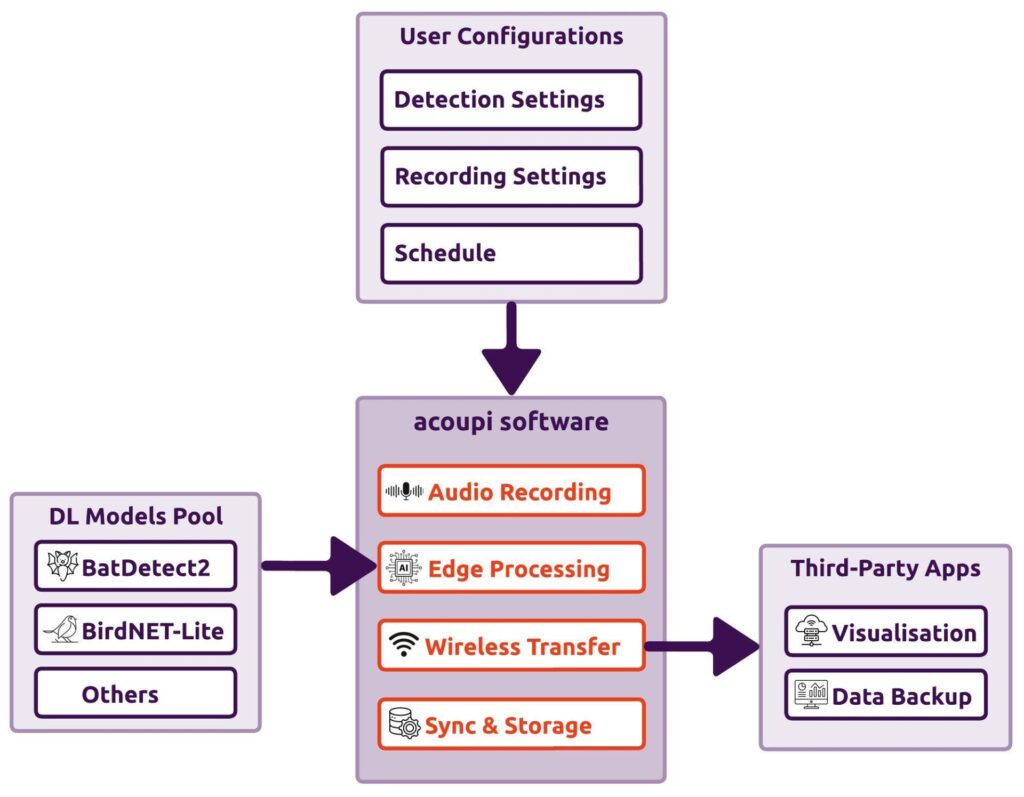Acoupi is an innovative open-source Python framework designed to facilitate the deployment of bioacoustic models, significantly benefiting research and conservation efforts.
Bioacoustics plays a crucial role in monitoring biodiversity, allowing researchers to analyze animal sounds to gather insights about species presence and behavior. The need for an open-source framework like Acoupi arises from the challenges associated with traditional passive acoustic monitoring (PAM) systems, which often require extensive resources and expertise to implement effectively.
What is Acoupi?
Acoupi is defined as a comprehensive framework that integrates audio recording, AI-based data processing, data management, and real-time wireless messaging into a single platform. Its core functionalities allow users to create and deploy smart bioacoustic devices easily. Unlike other frameworks, Acoupi stands out due to its modular design, enabling users to customize various components according to their specific monitoring needs. Supported use cases include species detection, acoustic monitoring, and noise analysis, making it versatile for different research applications.

Key Features of Acoupi
- Ease of Deployment: Acoupi simplifies the implementation of bioacoustic models, allowing users to deploy systems with minimal coding.
- Pre-trained Models: It offers pre-trained models such as BirdNET for bird species classification and BatDetect2 for bat species detection, which can be easily integrated.
- Custom Model Support: Users can extend the framework by incorporating their own models, providing flexibility for specialized applications.
- Real-time Processing: The framework is optimized for speed and performance, enabling real-time analysis of acoustic data.
- Integration with Machine Learning Libraries: Acoupi is compatible with popular libraries like TensorFlow and PyTorch, enhancing its functionality.
How Acoupi Works?
The workflow of Acoupi involves several steps:
- Installation: Users can install Acoupi using pip and manage dependencies easily.
- Data Input and Preprocessing: The framework supports various audio input formats and preprocessing techniques to prepare data for analysis.
- Running Models and Analyzing Results: Users can execute models on collected data and analyze the output through a user-friendly interface.
Who Should Use Acoupi?
Acoupi is tailored for a diverse audience, including:
- Researchers in Bioacoustics and Ecology: Those studying animal behavior or biodiversity can leverage Acoupi’s capabilities.
- Conservationists and Wildlife Monitoring Organizations: The framework aids in monitoring endangered species and assessing habitat health.
- Machine Learning Practitioners: Individuals working with sound data can utilize Acoupi for developing custom solutions.
- Developers: Software developers can integrate bioacoustic models into applications using Acoupi’s standardized approach.
Common Use Cases
Acoupi supports various applications in bioacoustics:
- Wildlife Monitoring: Identifying species through forest recordings.
- Marine Bioacoustics: Tracking sounds from whales and dolphins.
- Urban Noise Analysis: Differentiating between natural sounds and human-made noise.
- Industrial Applications: Detecting sound anomalies in manufacturing processes.
Acoupi vs. Other Bioacoustic Frameworks
When compared to existing solutions like Raven, Arbimon, and BirdNet, Acoupi offers distinct advantages:
| Feature | Acoupi | Other Frameworks |
|---|---|---|
| Open-source | Yes | Varies |
| Customizability | High | Moderate |
| Real-time processing | Yes | Limited |
| Supported hardware | Raspberry Pi | Varies |
Getting Started with Acoupi
To get started with Acoupi:
- Basic Installation: Install via pip with simple commands.
- Running a Sample Model: Users can execute pre-built models for quick testing.
- Tutorials and Documentation Links: Comprehensive guides are available on the GitHub repository.
Community and Contribution
Acoupi encourages community involvement through:
- Contributing to the Project: Users can contribute code or documentation via GitHub.
- Community Forums: Engage with other users for support and collaboration.
- Future Roadmap: Planned features will enhance functionality based on community feedback.
Conclusion
Acoupi presents numerous benefits for researchers and developers alike by simplifying the deployment of bioacoustic models. Its modular design allows for extensive customization while maintaining ease of use. Developers and researchers are encouraged to explore Acoupi by downloading it, contributing to its development, or providing feedback to enhance its capabilities further.
READ Original Paper: https://arxiv.org/abs/2501.17841











